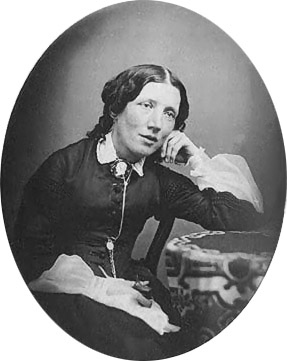

Harriet Beecher Stowe and a Book that Changed the World
Today marks the death of Harriet Beecher Stowe (1811-1896), a Christian whose storytelling ability inspired thousands to see the evils of slavery.
07/1/22
John Stonestreet and Glenn Sunshine

Today marks the death of Harriet Beecher Stowe (1811–1896), a Christian whose storytelling ability inspired thousands to see the evils of slavery. Born in Litchfield, Connecticut, Harriet was the sixth child of prominent Presbyterian minister Lyman Beecher. Unlike many girls from that time period, she received a first-class education, attending the Hartford Female Seminary which was run by her older sister Catharine.
In 1832, Harriet’s father became president of Lane Theological Seminary in Cincinnati, Ohio. The city was booming at the time, but competition for jobs between Irish immigrants and runaway slaves often erupted in violence, with the Irish attacking the black community. In 1834, the seminary held debates about slavery that, won by abolitionists, may have helped spur anti-abolitionist riots in 1836 and 1841. It was by witnessing these events that Harriet not only became interested in the issue of slavery, but also began to interview runaway slaves.
Harriet and her husband Rev. Calvin Stowe relocated to Maine in 1850. That same year, Congress passed the Fugitive Slave Law, which prohibited aiding runaway slaves, even in free states. As ardent abolitionists, the Stowes ignored this law. In fact, they made their home a station on the Underground Railroad.
After losing her 18-month-old son, Stowe’s sympathy for slaves separated from their families on the auction block deepened. Inspired by a vision of a dying slave, which she claimed to have experienced during Communion at her church, Stowe began to write the book for which she is now so well known. It is a book that can truly be said to have changed the world.
Uncle Tom’s Cabin was originally published as weekly installments in the anti-slavery journal The National Era, between June 5, 1851, and April 1, 1852. It was first published in book form in March of 1852, and sold an unprecedented 300,000 copies within its first year. By November of that same year, it was made into a play in New York. By 1857, the novel had been translated into 20 languages. Eventually, Uncle Tom’s Cabin would become the second bestselling book of the 19th century after the Bible.
While the main theme of the book is the evil of slavery, it also includes significant reflections on the nature of Christianity, Christian responsibility, and Christian love. In the end, Stowe clearly and compellingly presents slavery as incompatible with Christian theology. In this, she followed the mainstream of Christian tradition since the Middle Ages.
Stowe hoped her book would show how slavery affected, not just those directly involved, but everyone in society. She also hoped to document the horrors of slavery which she had learned directly from escaped slaves. In each of these aims, the book succeeded admirably. Its popularity energized the abolitionist movement in the North, and prominent abolitionists such as Frederick Douglass promoted it as a vital tool in the battle against slavery.
Not surprisingly, Uncle Tom’s Cabin generated significant backlash in the South. Southerners complained the novel was slanderous and accused Stowe of not knowing what she was talking about. Some Southern authors responded with novels of their own that defended slavery, but none that approached the success of Uncle Tom’s Cabin. Stowe received hate mail from defenders of slavery in both the North and the South, including one package that contained the severed ear of a slave, ironic evidence for the accuracy of her description of slavery’s horrors. In response to her critics, Stowe wrote A Key to Uncle Tom’s Cabin, in which she documented the sources used in her novel, as well as the accounts that corroborated her descriptions.
During the Civil War, Stowe was invited to the White House. Lincoln is said to have greeted her with the words, “So you are the little woman who wrote the book that started this great war.”
Altogether, Stowe wrote 30 books, including novels, travel memoirs, and collections of articles and letters. As important as she was as an author, she was equally famous for her public stands on the important social issues of the day, from slavery to women’s rights. Her courageous life is a profound example of someone using their calling to engage the world around them. By obeying God’s calling on her life, using her God-given talent in the time and place in which He called her, she changed her world and continues to influence ours. May we also have the courage to do the same with our own skills in this cultural moment.
Have a Follow-up Question?
Up
Next















